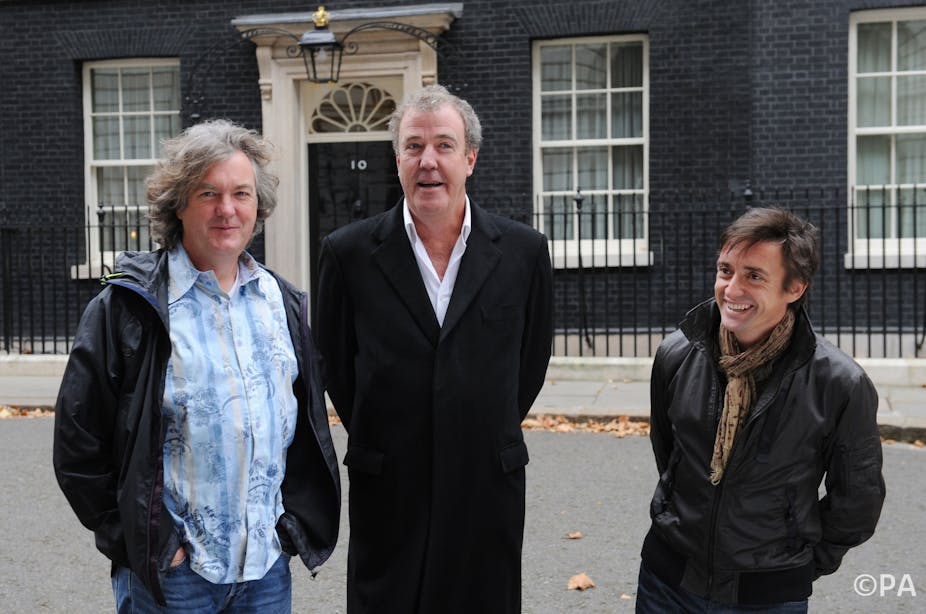So Jeremy Clarkson has gone: sacked, not because of a “politically correct” BBC out of touch with its grass roots – as its critics tirelessly maintain, but because he allegedly lost his temper with a member of staff and then hit him.
The director-general of the BBC, Tony Hall, announcing that Clarkson’s contract would not be renewed said:
I cannot condone what has happened on this occasion. A member of staff – who is a completely innocent party – took himself to Accident and Emergency after a physical altercation accompanied by sustained and prolonged verbal abuse of an extreme nature. For me a line has been crossed. There cannot be one rule for one and one rule for another dictated by either rank, or public relations and commercial considerations.
Hall had no option. Once an allegation had been made (and oddly enough Clarkson reported his own behaviour to the BBC) management was forced to implement the BBC’s own anti-bullying procedure which was put into place with involvement of the National Union of Journalists and the Broadcasters union (BECTU) in the wake of the Jimmy Savile affair.
As BECTU assistant secretary, Luke Crawley told the Guardian: “I’ve been around the BBC 25 years and don’t know of any cases when people have been found guilty of fighting and remain in employment – and that includes senior executives.”
Yet one million enraged fans petitioned, demanding Clarkson’s reinstatement and David Cameron went out of his way to support him. Such top-level endorsement of a television presenter who has well overstepped the line, even by a prime minister, is not new.
Margaret Thatcher was a big Jimmy Savile fan, insisting on a knighthood for him at a time when there was already concern about his behaviour even though the extent of his crimes didn’t come to light until after his death.
There is of course no comparison to be made between Savile and Clarkson; the former is known to have been guilty of sexual crimes against children, the latter is only known to be guilty of arrogance, racist and sexist language and, in this final case, bullying.
What does connect them however, is the degree to which their behaviour has been condoned or covered up, because of their celebrity.
Too big to sack?
Celebrity impunity is a dangerous thing. It creates the conditions in which bullying thrives. Probably the ugliest part of this episode is not the man himself but those who have supported him. It seems incredible that a prime minister should feel able to stand up in public and suggest that a public institution should find a way to “resolve” the issue because Clarkson is a “huge talent”. And besides, his children would be upset if he was sacked.
This is not the first time that Cameron has shown public support for Clarkson. Three years ago when Clarkson “joked” that “public sector workers should be shot”, Cameron said he was just being “silly”. Arguably the BBC should have taken action at the time, the fact that it did not do so probably allowed his sense of impunity to grow.
It is equally alarming that so many have taken to Twitter to decry the BBC for its actions in sacking Clarkson many of the tweets are from people threatening violence against Oisin Tymon, the man who Clarkson was found to have assaulted.
Remember Angus Deayton?
The BBC is a public institution, paid for by public money. This time, so soon after the Savile affair, it could not duck its responsibility to hold celebrity power in check – and there is little doubt that those who would support the BBC’s position outnumber the trolls.
While Top Gear is an international brand with 350m views worldwide, the local versions of the programme are presented by local hosts – so predictions of its imminent demise are probably exaggerated.
Even here in the UK there is no reason to suppose that the audience will disappear overnight. Nearly 13 years ago, Angus Deayton was sacked from fronting Have I Got New For You after some fairly seamy allegations about his private life hit the tabloid press. At the time the pundits suggested that the programme could not possibly survive without him.
Today few people even remember that Deayton used to host the programme. The format was indeed bigger than the man.

